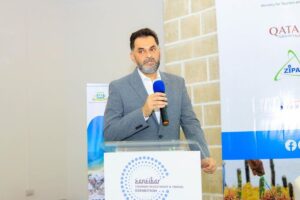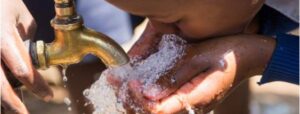Lydia Charles Moyo vividly recalls the realities of her school days, which were far from rosy. Raised by a single mother, Lydia attended public schools, where resources were scarce, and the environment was less than conducive to academic success.
Her secondary school, Kingongo, on the outskirts of Dar es Salaam city, was especially challenging, lacking basic facilities such as libraries and laboratories. With no mathematics teacher for an entire year and a daily two-hour walk to and from school, Lydia witnessed many of her peers, especially girls, drop out due to poverty, early marriages, and teen pregnancies.
Despite these challenges, Lydia was one of the few who persevered. Out of 200 students, only nine made it to high school, and she was one of the three girls who did.
The sense of responsibility she felt for her friends who couldn’t continue with education spurred her to action. Along with her friends, she started campaigns in high school to boost girls’ confidence and educate them about their rights.
Today, she heads an organisation, Her Initiative, recognised as a youth-first and women-led NGO that offers programmes to equip young women with education, skills, and resources for entrepreneurship and employment. It leverages technology to advance digital inclusion and remove barriers for young women and girls.
“When I got to high school, I felt this huge guilt because I’d left my friends behind. And I knew it was not that they were not smart, but we did not have a conducive environment that supported us academically. So I spoke to a few of my friends and we started campaigns in schools to boost girls’ confidence and esteem because we realised the reason we made it to high school was because we had the urgency and the confidence to navigate the day-to-day challenges to achieve our dreams. So we wanted to instil this in our peers. We also spoke to them about their rights,” she explains.
Together with her friends, they invited role models from various fields to inspire the girls and provide guidance on succeeding in life.
By the time Lydia joined university, many of her peers were still struggling to meet their basic needs, often resorting to risky behaviours for financial gain. Determined to make an even bigger difference, she and her friends organised entrepreneurship workshops aimed at fostering financial independence among college girls.
Lydia Charles Moyo receives the King Baudouin Foundation 2023-2024 Africa Prize for Her Initiative organisation. PHOTO | POOL
A programme known as Panda, Kiswahili for “plant” – denoting the initiative’s objective of planting the seeds of financial self-reliance. The programme reached more than 1,000 young women in Dar es Salaam and Mwanza.
After working for a few years post-graduation, Lydia decided to dedicate herself full-time to the empowerment of girls and women. In 2019, she established Her Initiative, aiming to empower young women through economic independence.
“Gender-based violence, underage marriage and HIV are just a few examples of the problems that are stopping women from going to school, getting a job and breaking the cycle of poverty. My friends and I experienced these barriers when we were in high school, and so we started to look for solutions to the challenges we were coming up against. And that’s how Her Initiative started,” Lydia says.
“We support young women to build their financial resilience in six Tanzanian regions, but with the KBF Africa Prize we will be able to scale our work to help so many more women to achieve their dreams in Tanzania and beyond.”

Lydia Charles Moyo makes her speech after receiving the King Baudouin Foundation 2023-2024 Africa Prize for Her Initiative organisation. PHOTO | POOL
The KBF Africa Prize is her latest accolade given by the King Baudouin Foundation, in recognition of her work to unlock women’s economic potential, tackle the youth unemployment crisis and accelerate economic and social development in sub-Saharan Africa.
Her Initiative recently won the King Baudouin Foundation 2023-2024 Africa Prize, receiving €200,000 ($218,267) to expand its impact and support 100,000 more women across East Africa, in achieving financial resilience, promoting financial independence, digital inclusion, and a thriving ecosystem of youth-driven organisations, over the next five years.
Additionally, the funds will help bring together an ecosystem of youth organisations to facilitate knowledge sharing, resource pooling and harnessing the power of African youth.
The prize comprises the opportunity to connect with the KBF’s international network of non-profits and development professionals.
The 2023-2024 Africa Prize was presented to Her Initiative at an awards ceremony held on June 27, at the Royal Palace of Laeken in Brussels, Belgium.
The organisation was selected from a pool of more than 400 applicants.
Bilikiss Adebiyi-Abiola, chair of the KBF Africa Prize Selection Committee 2023-2024 said: “The selection committee was highly impressed with Her Initiative’s combined approach to advancing women’s rights and financial independence. Coupled with its innovative use of modern technologies and strategic local partnerships, Her Initiative is a highly deserving recipient of this year’s KBF Africa Prize. We look forward to seeing what the team achieves in the years to come.”
The KBF Africa Prize recognises African organisations working to drive African-led solutions to the challenges facing the continent and to sustainably improve the lives of Africans. The Prize plays a transformative role in helping organisations scale up and advocate for their work on a wider stage. Several past laureates, including Dr Denis Mukwege, Elman Peace and Grameen Bank, have since been awarded and shortlisted for the Nobel Peace Prize.
Since its inception, Her Initiative has grown significantly, reaching over 15,000 young women and girls across Dar es Salaam, Mwanza, Iringa, Morogoro, Pwani and Dodoma regions. The organisation offers diverse programmes tailored to the needs of girls in and out of school and unemployed youth.
For schoolgirls, Her Initiative runs Mshiko Clubs, which focus on promoting the capacity of women and girls for entrepreneurship and financial literacy. These clubs engage them in savings challenges, small businesses, and rights education, boosting their confidence and interest in continuing their education.
For girls out of school, the organisation provides skills, resources to start small businesses, and education on gender-based violence (GBV). This support helps them become economically independent and less vulnerable to exploitation.
For young women entrepreneurs, Her Initiative’s Panda Digital platform offers hybrid e-learning opportunities. Through a combination of website access and AI-powered SMS courses, young women acquire business skills and certifications, regardless of their internet access.
The other programme, Digimali, helps young entrepreneurs digitalise their businesses, enhancing their reach and efficiency in the digital economy. yet another project, Youth Employability Bootcamp, targets unemployed young women and men, providing skills training and job placement assistance.
“With the financial support, we plan to scale our programmes, leveraging the network and publicity from KBF to attract new partners who can invest in our initiatives. Additionally, we’ll continue learning from different partners within KBF’s network, including previous winners who are doing exceptional work in other countries,” Lydia says.
Her Initiative already collaborates with youth-led and women’s rights organisations in the country, such as Wildaf (Women in Law and Development in Africa) and Digital Opportunity Trust.
This year has been particularly good for Her Initiative. In May, the organisation won the Global Citizen Award in New York, as well as received the Tanzania Digital Award. Additionally, it’s been recognised by the Tanzanian Ministry of Gender for its support for girls across the country and by Mkwoki, a coalition of organisations fighting against gender-based violence, for the innovation in accelerating GBV reporting within the Panda digital platform.













